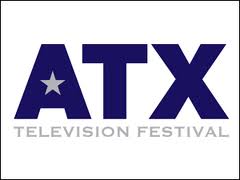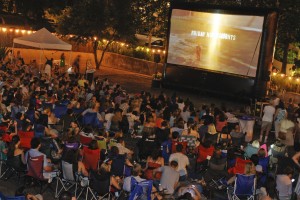Report from the ATX Television Festival
 What is a “television festival”? What might such an event look like? The answers emerged at the ATX Television Festival, held in downtown Austin, TX from June 1st to 3rd.
What is a “television festival”? What might such an event look like? The answers emerged at the ATX Television Festival, held in downtown Austin, TX from June 1st to 3rd.
What I discovered: A TV festival, at least as envisioned in this early iteration by organizers Caitlin McFarland and Emily Gipson, fuses elements of comic conventions, film festivals, and Paley Center-style panels. Further, this festival appealed to those interested in learning about the inner-workings of the television industry through sessions such as “Stages of a Writing Career” and “Book to TV Series.” It also targeted fans with panels dedicated to specific shows or genres (e.g., “One Tree Hill Says Goodbye” and “Friday Night Lights Revisited”). What’s more, it offered attendees the opportunity to revisit their favorite shows – or be exposed to new ones – through separate screenings accompanied by Q&As with key talent (e.g., the screening of the Criminal Minds season finale followed by a session with showrunner Erica Messer).
As these examples suggest, the ATX festival was ambitious in the types of programming it screened as well as the range of talent it featured. Though cult and genre fare had their place with panels such as “TV Fantasy Goes Mainstream” and screenings of shows such as Firefly, the organizers made a concerted effort to include other types of programming as well. Opening night included screenings of episodes of USA Network series Suits and Royal Pains. Highlights from local PBS station KLRU were shown during one session, while an unaired CW pilot, Heavenly, screened at another time. Saturday’s events began with screenings (and pancakes) sponsored by Hasbro Studios and The Hub.
The organizers should be lauded for their effort to appeal to both industry aspirants and everyday fans, and to feature both niche and mainstream fare. Considering this was their first attempt at such an event, its size and scope were impressive. By setting such wide-ranging goals, they exposed many of the challenges involved in conceptualizing and executing a “TV festival.” Still, I kept asking myself, “who is this for”? Can – or should – an event such as this try to cram so many views and visions of television into one weekend? Or should there be even more variety – more imported shows, more reality programming, more daytime content, more historical fare? And what does it mean to “screen” programming? Is the film festival screening model useful, especially since there is no competition component for a TV festival and much of the programming already has been aired and is now widely available for home consumption?
These questions should not be seen as criticisms of the event. Rather, they should point to larger questions about what the functions of a television festival might be and what audiences these events might attract. These questions seem particularly pertinent because the TV festival concept is such a compelling one; I can envision this type of event being replicated by other cities in the future. Of course, in asking these types of questions, I echo many of the larger questions about television that have been raised by TV studies scholars at conferences and in publications over the last several years. Perhaps this event was so intriguing to me because it was another way that television’s current messiness and uncertain cultural, technological, and industrial status were exposed.
To the best of my knowledge, and based on my conversation with McFarland and Gipson, the idea of a TV festival is a relatively new one. Though there are precedents in events such as the New York Television Festival and the Monte Carlo Television Festival – as well as the aforementioned festivals, comic conventions, and industry oriented panels – the ATX Television Festival nonetheless remains distinctive in its range of programming, its varied audience appeals, and its friendly, low-key Austin vibe. Certainly the idea of a TV festival seems like one whose time has come, especially in light of the greater cultural legitimacy with which (certain) television programming has come to be viewed. Nonetheless, programming a television festival looks to be a tricky endeavor, and this festival only reinforced this perspective.
To conclude, a few stray observations regarding what I found most striking in going to this event:
- The attendees were predominantly white twenty-to-forty-something women. At one panel, “Conversation with Katims,” I took a rough head count of the room and noted that, of the approximately 60 attendees, 45 were women. In fact, there were more men in this session than in most others I attended. This is a marked contrast to the comic conventions and film festivals I have been to.
- A recurring theme at the panels I attended involved the influence and importance of the WB network. This may have been because two of these panels were moderated by former WB executive Jordan Levin or it may be a result of the social ties of the attendees. Nonetheless, it was odd how often the netlet was evoked.
- Television scholars and critics were largely absent from the festival, both as attendees and as moderators/panelists. This proved frustrating at times. For instance, the conversation at the enjoyable “Women in Television” panel might have had even more depth if some journalist-critics and scholars had been involved in the conversation. This type of event seems like just the right place for members of the industry, academy, and audience to engage in a productive dialogue about the medium.
- On several panels, writers discussed the programs that most influenced them. The titles I heard most frequently cited might come as a surprise: Days of Our Lives, Cheers, and My So-Called Life.
- One of the most enjoyable panels I attended was “Bill Lawrence and Friends.” Cougar Town showrunner Lawrence began the panel by giving the audience pennies to throw in the penny cans place on stage. Then, as Scrubs’ “The Todd” (Robert Maschio) moderated, Cougar Town’s Bobby Cobb (Brian Van Holt) served audience members wine.
What do you think of the idea of a television festival? Do you know of or have you attended similar events?




When I first heard about this — from you, in fact, only a few weeks before it was held — I was amazed. I would have loved to attend this! But it was too late at that point for me to make plans for it. It takes a lot to get a major TV event past my attention, so I can only assume that there was problematic marketing here. Maybe that’s because there aren’t regular channels through which a TV festival would be marketed yet, the way there is with film festivals. But I love the idea of a nexus of fans, academics, and critics convening (right now, that probably only happens on Twitter), so perhaps that can happen with future festivals.
This is really fascinating, Alisa. Thanks for the report. One of the things that your post has me pondering is the diversity of television and how best to reflect that. Were there any panels on news, for example? Seems a great conversation could come from a discussion of the ideological slant of cable news, Sunday morning news chat programs, or even the role of localism for programs produced by local stations. In other words, was this a festival dedicated mostly to fictional primetime programs or did it attempt to encompass the diversity of the medium?
Also, did UT, Austin play a role at all? The article you link to describes a partnership between the festival organizers and various media figures/companies, but I did not see an explicit tie to academia. Does a festival that is organized with a clear promotional motivation limit its relevance for scholars? I absolutely agree that this seems an opportunity to encourage conversation among scholars, industry figures, and critics, but I wonder if there are inherent limits due to the organizers goals.